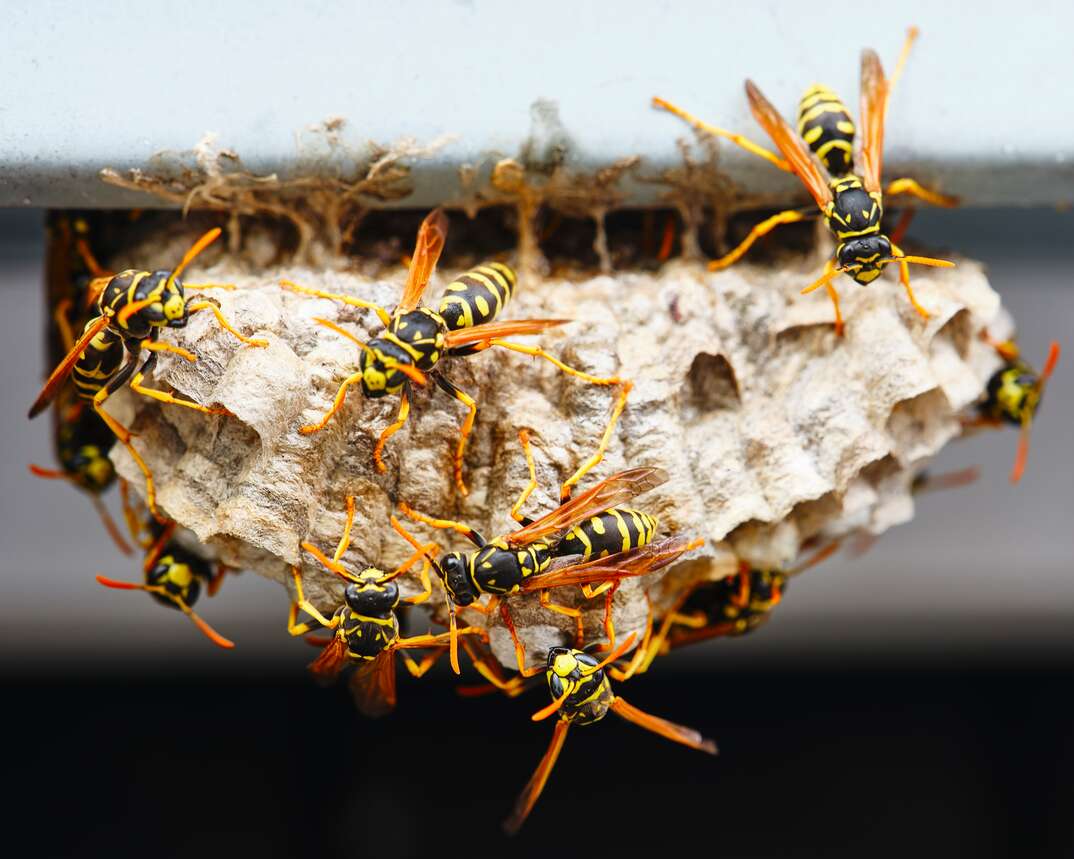- AppliancesElectriciansHVACLandscapingLocksmithPest ControlPlumbingRenovationRoofingT V RepairAll Home Improvement
- Car AccidentClass ActionCorporate LawCriminal DefenseDivorce LawEmployment LawFamily LawFinancial LawLegal AidMedical Injury LawyersMedical MalpracticeReal Estate LawWater Fire RestorationAll Legal
- InvestmentRetirementAll Finance
- Animal InsuranceAutoGeneral InsuranceHealth PolicyHome RentersAll Insurance
- DentalHealth SpecialistsAll Medical
- Animal CareVeterinaryAll Pets
- Auto GlassTowingAll Automotive
Stung by a Hornet or Wasp Infestation? Read This Guide

Sooo … You’ve got wasps. Or bees? Or hornets? Whatever they are, you know they look like they sting, and you want to get rid of them as quickly as possible.
Read More Home Improvement Articles
Let's explore some wasp and hornet extermination techniques and learn how much professional extermination costs.
Wasps, hornets and bees all have distinctive black and yellow stripes. Bees have fuzzy bodies, but wasps and hornets have hairless exteriors. Bees are also herbivores, feeding mainly on nectar and pollen. Meanwhile, wasps and hornets are carnivorous scavengers and eat other insects and discarded food.
Hornets are a type of wasp and are significantly bigger than most wasp species. Generally, wasps measure 1 inch long or less, but hornets can grow up to 1.5 inches.
Do Wasps and Hornets Sting?
Wasps and hornets will sting when they feel threatened, and this usually happens when someone disturbs a nest. Unlike bees, wasps and hornets don't die after stinging, meaning the same one can sting multiple times.
However, hornets tend to be significantly more aggressive than regular wasps. Their stings also hurt more because they contain more venom.
Hornet and wasp stings can cause symptoms around the sting site, including:
- Pain
- Skin irritation and redness
- Swelling
- Warmth
- Itching
Occasionally, wasp and hornet stings can cause more severe reactions. Seek immediate medical attention if you develop more widespread symptoms such as breathing difficulties, vomiting or coughing.
Seeing a couple of wasps or hornets in your home or yard isn't usually cause for alarm. However, you may have an infestation on your hands if you see multiple insects. You'll usually hear a loud buzzing noise around the nest site. You may also notice a tapping sound if the nest is inside a wall cavity or attic.
Another sign of a wasp or hornet infestation is the presence of visible nests. Wasps and hornets make their nests from chewed wood and saliva, giving them a gray, paper-like appearance. You might notice tiny holes in woodwork, but other common pests can also cause wood damage.
Nests can be tricky to spot because they're often in tucked-away areas. Common sites include eaves, bushes, attics and trees. Be cautious when looking for the nests, as accidentally disturbing them could cause the wasps or hornets to chase and sting you.
More Related Articles:
- What to Look For When Hiring an Exterminator
- Are Pest Control Products Dangerous For Kids and Pets?
- What Are Ultrasonic Pest Repellers?
- 10 Ways to Prevent Termites
- How to Spray for Mosquitoes
Can You Get Rid of Hornets and Wasps Yourself?
You can try getting rid of hornets and wasps yourself, but it's a risky business. It's essential to plan your escape from the nest site and wear protective clothing to guard against stings. Wasps and hornets can sting through single fabric layers, so aim to wear as many tightly-woven layers as possible.
Wasps and hornets tend to be less active at night, so a nighttime ambush can be safer. Locating and dealing with nests in early spring is often safer than waiting until the infestation becomes more established in the summer.
Some people prefer to call a wasp or hornet extermination company to avoid the risk of stings. If you want to get rid of them yourself, the following methods can be effective.
Boiling Water
If you can access an area above the nest, pouring a bucket of boiling water over it will eradicate as many insects as possible and destroy the nest structure. You may need to repeat the process several times before the nest falls apart completely. It's best to leave a few days between attempts instead of attacking again while the wasps or hornets are still angry.
Soapy Water
Adding soap to your bucket of boiling water can make the above method more effective. The soap will coat any surviving wasps or hornets, making it harder for them to swarm and attack you.
Pesticide Sprays
You can purchase pesticide sprays designed to kill wasps and hornets from a significant distance. They contain neurotoxins that kill the insects on contact. Although some people feel uncomfortable using these products around their homes, they can be a good option if the nest's position makes it impossible to reach from above.
How Much Does Wasp and Hornet Extermination Cost?
If the infestation is extensive, you can't find the nest or you don't want to risk a sting, hiring a hornet or wasp extermination professional may be the best choice. Most homeowners pay around $400 for wasp extermination, and hornet extermination costs around $450.
How Do You Prevent Wasps and Hornets From Infesting Your Home?
You can stop wasps and hornets from getting inside your home by sealing any cracks in the exterior. It's also important to keep any sweet foods in airtight containers, as they can attract wasps. While it may seem intuitive to swat them, killing wasps and hornets releases pheromones that could attract more.
Elocal Editorial Content is for educational and entertainment purposes only. Editorial Content should not be used as a substitute for advice from a licensed professional in your state reviewing your issue. Systems, equipment, issues and circumstances vary. Follow the manufacturer's safety precautions. The opinions, beliefs and viewpoints expressed by the eLocal Editorial Team and other third-party content providers do not necessarily reflect the opinions, beliefs and viewpoints of eLocal or its affiliate companies. Use of the Blog is subject to the
Website Terms and Conditions.The eLocal Editorial Team operates independently of eLocal USA's marketing and sales decisions.



